The shooting of When Harry Met Sally happened in mid to late ’88, when Billy Crystal was just turning 40 and Meg Ryan was 28 or thereabouts. Aline Brosh McKenna‘s Your Place or Mine is from the same romantic hymn book, except the would-be lovers are in their mid 40s — Ashton Kutcher is 44 and Reese Witherspoon is 46. Working from her own script, McKenna is making her directorial debut. She previously wrote The Devil Wears Prada, 27 Dresses and Morning Glory. She knows how to make this kind of material work. The film opens on Netflix on 2.10.23.
I don’t want to sound mean but Meg Ryan‘s Ithaca, which screened tonight at the Middleburg Film Festival, isn’t good enough to warrant a full review. It was shot too fast (23 days) for too little money in Virginia, and I’m afraid that Ryan’s inexperience sealed its fate. I’m sorry but that feeling when a movie isn’t cutting it is unmistakable. Ithaca lacks tension and at times clarity; it seems under-energized, even amateurish at times. I didn’t care at all for Andrew Dunn‘s cinematography (particularly the framings) and the lazybones editing by John F. Lyons; nor was I taken by Erik Jendresen‘s in-and-out screenplay.
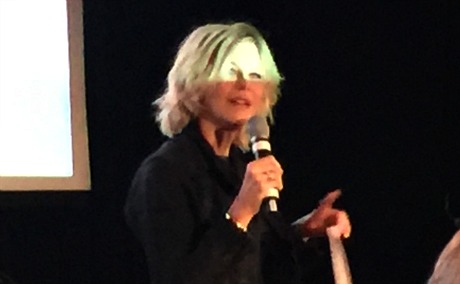
Ithaca director-costar Meg Ryan introducing her film before a Middleburg Film Festival audience earlier this evening.
Set during World War II and based on William Saroyan‘s 1943 novel “The Human Comedy“, which began as a script for a same-titled, allegedly sentimental Mickey Rooney movie which opened a month after the book came out, Ryan’s film is basically about small-town residents coping with war-related death and loss.
It focuses on Homer (the good-looking Alex Neustaedter), a teenager working as a part-time telegram delivery guy in Ithaca, a small town in California’s San Joaquin Valley. If you’ve got a son or husband fighting Hitler or the Japs and you see Homer heading towards your home with an envelope in his hand…watch out! Ryan plays Homer’s widowed mom, Tom Hanks her deceased husband (a cameo-sized role, shot in a day) and Sam Shepard is Homer’s grizzled, laid-back boss at the telegraph office.
If Ryan had been content to shoot it simply like an ’80s TV movie it might have been something, but for my money she tries too hard (which first-time directors often do) and lays on the you-don’t-wanna-know. I’m sorry but it’s…fuck it, I don’t want to cause pain or say any more. HE to Ryan: It’s very hard to make a good film — I get that. Try, try again.
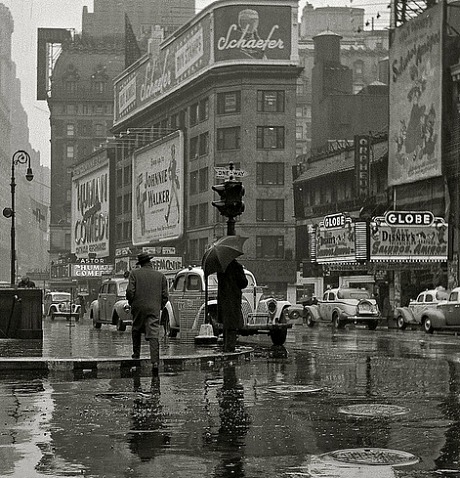
Times Square in March 1943 — the sentimental movie version of William Saroyan‘s The Human Comedy with Mickey Rooney in the lead role is playing at the Astor.
Variety‘s Courtney Howard and The Hollywood Reporter‘s Frank Scheck have reviewed Meg Ryan‘s What Happens Later (Bleecker Street, 11.3), an older person’s romcom set in a snowbound airport, and based upon Steven Dietz’s play Shooting Star.
Apart from noting that it’s a two-hander and agreeing upon the magical realist atmosphere, the disparity of opinion is startling.
Scheck: “Not so much a romcom as a comic drama infused with strong doses of magic realism that some viewers will find charming and others insufferably twee. What might have proved effective theatrically comes across as wholly artificial and schematic onscreen, despite Ryan’s considerable efforts as both director and performer. The proceedings inevitably feel claustrophobic. While Ryan’s bountiful charm is as evident as ever, her character unfortunately comes across like an older version of the manic pixie dream girl. And the movie’s heavy-handed magical realist elements counter the slightness of the material to deadly effect.
Howard: “Meg Ryan not only dazzles before the camera in What Happens Later, but behind it as well, as director and co-writer. Through the prism of one former couple’s relationship woes, this effervescent, enlightened romantic comedy explores our innate need for reconciliation within ourselves and with each other. It’s a delight to welcome Ryan back to the silver screen after an extended hiatus, and in the genre she helped rejuvenate alongside filmmakers like Rob Reiner and Nora Ephron (to whom this film is touchingly dedicated).”
I haven’t seen What Happens Later, but Howard’s use of the term “touchingly dedicated” almost certainly indicates bias. She’s in the tank for romcoms, I suspect, and loves the idea of Ryan making one of her own.

If, like myself, you’re a foot man, you probably agree that the recent hoopla over that Barbie shot of Margot Robbie‘s arched feet brought about a certain realization. It reminded me of an unfortunate or at least a lamented reality, which is that over 99% of the female peds out there (and I often have my eyes peeled) are no match for Robbie’s.
Outside of the Hollywood and modelling worlds, exquisite, perfectly shaped feet are such a rarity that numerical percentages are almost unworthy of mention.
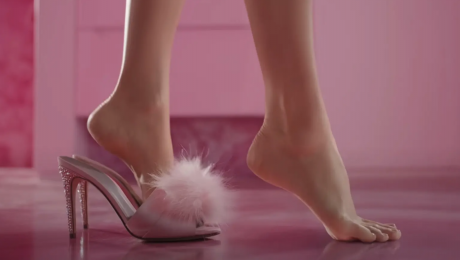
East Coast Friendo: “My wife and I went to see Bros at our local multiplex; 4pm show on a weekday, so there were fewer than five other people. We thought it was very funny, smart and moving.
“As I was thinking about why it’s been such a box-office flop, I think the idea that it feels too woke and preachy misses the mark. When you get right down to it, it was so obviously gay that I understand why it didn’t find a mass audience.
“It’s one thing for Will & Grace, essentially the minstrel version of gay people, to be popular. But I don’t think most moviegoers are ready to watch men kissing, simulating sex and making jokes about ‘your gigantic penis and my tiny little anus.’ I laughed, but I think it would make many people in the flyover squirm.
“I don’t believe I’ve ever seen a mainstream Hollywood film which included an explicit romantic sex scene w/men having face-to-face intercourse while lying down (something you see in hetero romcoms all the time). I’ve also never seen one in which the role of ‘the bottom’ is as explicitly laid out as it is here, where the top says, ‘I want you to fuck me tonight.’
“I would imagine there are a lot of people who are interested in the film but wouldn’t want to be seen attending it or even be known to have watched it. So maybe it will find its audience when it streams and moves to the other platforms.”
West Coast Friendo: “You don’t see much sex in romcoms either. That’s the point. They’re basically grown up fairy tales for heterosexual women. The genre is called ROMANTIC comedy, not sex romp. Thrillers tended to have more sex in them, although even that has been purged.
“No romcom would have Tom Hanks with his hands on Meg Ryan’s boobs or ass on the poster.
“Bros. should have been put on Streaming or HBO where it would have been devoured by its target demo.
“Why didn’t it debut on streaming? Because it’s a missionary movie — its aim is not entertainment but conversion.
“I couldn’t even get a black gay friend to see it with me. ‘It looks stupid,’ he said.”
HE to East Coast Friendo: “Ahh, the joys of gay sex! You brought up Bros sex so allow me to continue the thread…
“What about the fat gay guy telling Eichner that some guy peed on another guy? Did you find that bit amusing or even appealing?
“I rolled with the graphic sexual behavior depictions in Bros, but I can’t honestly say they were particularly welcome.
“Like I said in one of my riffs, at times the depictions almost approached the graphic levels of Frank Ripploh’s Taxi Zum Klo.
“40-plus years ago Eddie Murphy’s ‘Mr. T in a gay bar’ routine was hilarious FOR A REASON. Apart from Murphy’s unfortnate use of the “f” word, it’s still funny. And the funniest line? Mr. T growling ‘I want you to come on over here, and fuck me in the ass.’
Hilarious then, but if you so much as snicker at such a scenario now you’re probably a homophobe and (who knows?) a possible candidate for cancellation.
Partial transcript from Chris Gore comments in 10.3 YouTube conversation titled “Billy Eichner’s “Bros” DESERVED to FAIL”:
Gore #1: “I hope I’m not offending anyone by saying this, but the majority of people [in this country] are straight. That is just a fact, and that is the way things are.” HE modifier: Gore forgot to say the word “vast” before “majority.” Before Zoomers came along (and I mean as recently as the mid-to-late teens) the LGBTQ populations was somewhere in the vicinity of 3.8% nationwide. Now it’s in the vicinity of 7.1%, but you can chalk that up to trendy Zoomer identity issues and fluidity.
Gore #2: “And that trailer…I saw that trailer in a theatre, and it ends with a character asking ‘do you remember straight people?’ and another saying ‘yeah, they had a nice run.’ People in the audience cringed. You could hear audible groans. Or silence. When your trailer for a romantic comedy…it should end with your biggest laugh, and yet they basically ended it with a ‘fuck you’ [to straight people]. It is never a winning strategy to insult your audience.”
Gore #3: “This movie is all about being gay…all about [Billy Eichner‘s] sexuality. If Eichner had made this movie for a million dollars and it had made $5 million dollars, we would be having a different conversation.”
Gore #4: “There are parts of the movie that I found offensive. [Eicher and Luke MacFarlane] are having dinner with Luke’s parents, and there’s a conflict with Luke’s mother, a second-grade teacher, who says ‘I think second graders are too young to be exposed to or educated about LGBTQ issues.” Which Eichner disagrees with. It turns into a huge argument, and also drives the third act of the movie. The scene is effectively commenting on the parental rights bill in Florida, described in [woke circles] as the ‘Don’t Say Gay’ bill…it’a a comment on that [Florida law]. The movie ends with the mother bringing her second graders to the LBGTQ museum that Eichner is the top administrator of, and I don’t know if this is a conversation that we need to be having…a plot point written by and made by people WHO DON’T HAVE FUCKING CHILDREN! I was offended and pissed off when I saw that.”
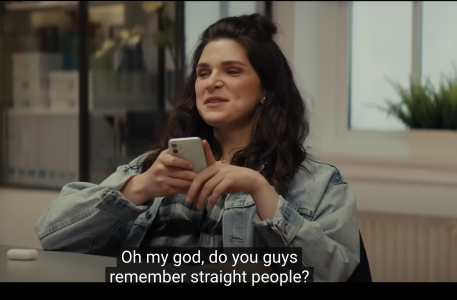


HE is down with Nicholas Stoller, Billy Eichner and Judd Apatow‘s Bros, which I saw Thursday evening. I admired the witty writing, the expert acting, the character-building and professional construction, and it also touched me in a somewhat old-fashioned way. It struck me as generally gutsy and first-rate schmaltz, and at times more than that.
Is it like a typical Meg Ryan and Tom Hanks romcom from the ’90s? Yeah, but a good one! And with boners and beards!
I felt a genuine kinship and a comfort level with the characters and even, to a significant extent, with the sexuality.
The alone-ness, defensiveness and brusque “I don’t trust you” personality of Eichner’s “Bobby Lieber”, an openly gay museum curator and musician, are very clearly and movingly conveyed, and I really liked Luke MacFarlane‘s “Aaron”, a muscular wills attorney and fledgling chocolatier whom Bobby falls for early on, only to stumble through the usual commitment-or-not issues.
I got as much of a relaxed upfront gay feeling from this as I did from Luca Guadagnino‘s Call Me By Your Name, which is much tamer and less sexually provocative than Bros.
Coming from a straight guy like myself, this kind of approval means something. Or it might mean something, I should say. I caught a 5pm showing of Bros with a friend in Westport, and we were the only ones in the house.
I don’t know what Apatow’s writing input was, but aside from the pointed, confessional, signature-level writing from Eichner, whose story this primarily is, I could feel the Apatow-ness all the way through. It had a King of Staten Island-like feeling of assurance and carefully measured control…a professional sense of timing and pacing and all-around wholeness that I bought into. (Eichner and Stoller are credited as cowriters.)
Speaking of my straightness, Bros struck me (and I know what this is going to sound like) as a little too pronounced in terms of the gay consciousness factor. Just a wee little bit.
Did everything in this movie have to be about sexuality and sexual identity and frank, take-it-or leave-it, this-is-what-gay-life-is-like revelation? How many lines in this film dealt with the occasional banality or neutrality of things? How many lines in this didn’t address or comment upon gay behaviors or culture or history? Damn few. As Sigmund Freud might have said, occasionally a gay man will enter a tobacco shop for a couple of good cigars, and he’ll just say “gimme a couple of good cigars” without mentioning or alluding to his orientation.
Bros has been described as a somewhat predictable, straight-laced gay romcom, but there’s nothing restrained about the sexual scenes, which at times almost reminded me of Frank Ripploh‘s Taxi Zum Klo. Forgive me but I somehow don’t recall a scene in Sleepless in Seattle in which Meg Ryan talked to a girlfriend about peeing on Tom Hanks, or told Hanks during a vulnerable moment that she wants him to fuck her, or that the last time his big fat banana slid into her she went “oh wow.”
There are two great scenes (okay, one and a half) with Debra Messing. The Abraham Lincoln-was-gay thing is simultaneously acknowledged as bullshit but also pushed a little too far. But Amy Schumer’s Eleanor Roosevelt and Kenan Thompson‘s James Baldwin are just right. Ditto Bowen Yang, Kristin Chenoweth, Harvey Fierstein, a Ben Stiller cameo, etc.
Forgive me but there’s so much in our daily lives that falls under the headings of “banal” or “middle class whatevs”, and this movie just won’t ease up with the avoidance of that banality and the persistence of the gay experience and corresponding sensibilities.
There’s a dinner scene with Aaron’s parents that drives this aspect home. Along with Aaron, I was silently begging Bobby to ease up and tone it down. In this scene Bobby voices his support for educating second-graders about gay views and lifestyles. I don’t care what this sounds like coming from me, but kids 10-and-under should be left the fuck alone. That part REALLY didn’t work for me.
But otherwise Bros is refreshingly smart and engaging and well-structured, and I really liked the romcom squareness of it all. I can’t think of a kicker line so this’ll have to do.
Last night and for the first time in 21 years, I re-watched Taylor Hackford and Tony Gilroy's Proof of Life. My vague recollection was that it had missed the mark, having lost money and gotten mixed reviews. I was wrong.
Login with Patreon to view this post
Nobody ever cats around on his or her partner in an upfront, honest way. They never do it with permission or pre-affair clearances. The horse always comes before the cart. Nobody ever says to his or her partner “I think we need to be apart for a while and decide what we really want” and then falls for someone else. 99% of the time the hunka chunka comes first, and then the cuckold smells it and accusations ensue, etc.
In a 1.8.21 People piece about the recent romantic triangle between the now-together Olivia Wilde and Harry Styles and Wilde’s cuckolded partner Jason Sudekis, Alexia Fernández and Melody Chiu report an old familiar tale…same as it ever was.
It all happened during the shooting of Wilde’s Don’t Worry, Darling, which Wikipedia describes as a “psychological horror film” set in the 1950s.
Excerpt: “While an insider told People [last] November that Wilde and Sudekis had split ‘at the beginning of the year‘ after seven years together, another source with knowledge of the situation refutes the claim, saying ‘Olivia and Jason were very much together as recently as [last October].”
Wilde fired the film’s lead actor Shia Labeouf (poor behavior, clashes with crew members) and replaced him with Styles. An affair between Styles and Wilde ignited fairly quickly once shooting began. The usual hints and signals were generated, and Sudekis gradually got wise.
People again: “Jason [explains] that the timeline that Olivia and Harry would like people to believe—that she and Jason split ages ago, long before she became involved with Harry — is simply not accurate,” says [a] source.
“She began filming Don’t Worry Darling in [the early fall], and by October, Sudekis began to get the impression that she wanted out. By November, they’d announced their split.”
And that, says the source, “is how quickly it happened, and none of it happened until she began filming with Harry.”
Any relationship counselor will tell you that infidelity is sometimes as much of a symptom of relationship troubles as a cause of them.
Then again sometimes a married actor will simply conclude that a certain costar is a hotter, more desirable partner than the person he/she is married to, as Brad Pitt apparently decided when he began cheating on Jennifer Aniston with Angelina Jolie.
Or when Elizabeth Taylor dumped Eddie Fisher when she fell for Richard Burton during the making of Cleopatra.
Or when Meg Ryan betrayed Dennis Quaid when she and Russell Crowe had an affair during the filming of Proof of Life.
Any way you slice it there’s no neat and tidy way to break up with your spouse after you’ve catted around behind their back. Especially with People and Hollywood Elsewhere writing about the blow-by-blow. Always messy, always hurts.
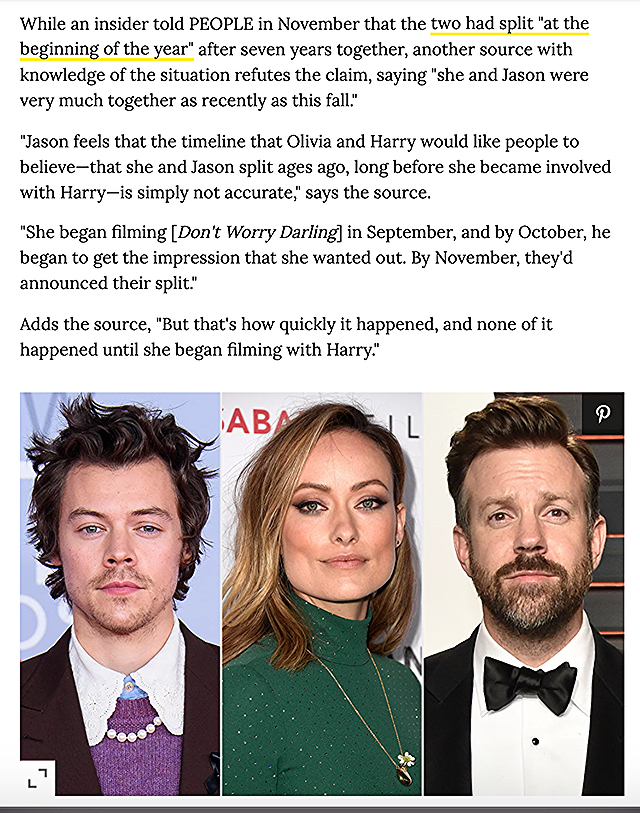

Yesterday HE’s Paranoid Bush tweeted that someone like myself “could write an entertaining if deeply inane Bill Simmons-y article about how the major romcom actresses of the 1990s, and how no one back then would have predicted Sandra Bullock would have the most significant staying power.”
At 54, Bullock has lasted longer in the box-office limelight and is still a fairly big draw, but romcom-wise all actresses age out. Most female romcom (or straight romance) stars enjoy a 10 to 15-year run until they hit 40 or thereabouts, and then their younger replacements move in.
Bullock became a marquee name in the mid ’90s with Speed, and then built her romcom (or straight romantic) brand with While You Were Sleeping, Two If by Sea, Hope Floats, 28 Days, Miss Congeniality, Divine Secrets of the Ya-Ya Sisterhood, The Lake House and The Proposal. Since that 2009 film she’s been more of a comedy star with occasional dramatic detours.
The top three ’90s romcom stars were Bullock, Meg Ryan and Julia Roberts. Ryan torpedoed herself with bad plastic surgery, of course. Roberts’ ’90s romcom run lasted from Pretty Woman (’90) to Runaway Bride (’99). She eventually graduated into somewhat older or middle-aged woman roles (mothers, detectives, business executives) starting around a dozen years ago.
Bullock, Ryan and Roberts’ contenders were Alicia Silverstone, Julia Stiles, Drew Barrymore and Cameron Diaz.
Silverstone peaked with Clueless, of course, and that was pretty much it. Stiles has a three-year romcom run in the late ’90s with 10 Things I Hate About You, Down to You and Save the Last Dance. Barrymore’s run was a late ’90s-to-late aughts thing — The Wedding Singer, Home Fries, Never Been Kissed, Riding in Cars with Boys, 50 First Dates, Lucky You, He’s Just Not That Into You. Diaz launched in the mid ’90s with The Mask, My Best Friend’s Wedding and There’s Something About Mary and kept it going into the early to mid aughts with The Sweetest Thing, In Her Shoes and The Holiday.
Originally posted 16 years ago: “In ’02 I wrote a short piece about a touchy anatomical subject — i.e., why feet are almost never given close-ups in films.
“Has anyone ever wondered why? Because 90% if not 95% of human feet are strange and alienating, is why. But it goes farther than that. For me, bare feet are a contemporary pestilence that no culture since the sandal-wearing Greeks and Romans has had to deal with. Once upon a time sandled feet were a subject for light mockery, something that only eccentric beatniks went for. Exposed digits have been ubiquitous, of course, in warm weather months since the mid ’60s. I for one regret it.
“Nobody talks about it, but everyone understands. In real life all but the most unusually perfect feet are good for a glance at best, and should rarely be contemplated further. This goes double for the movies. Hands, kneecaps, ear lobes, fingers, noses, biceps, chest hair (or lack of) — these and others anatomical features are routinely displayed in films. But never feet.
“Well, almost never.
“There’s a close-up of Michael Keaton and Geena Davis‘ bare feet soaking in a fountain in Ron Underwood‘s relationship comedy Speechless (1994). An argument could be made that this insert shot was one of the reasons it didn’t perform all that strongly. I remember recoiling in my theater seat after glancing at those gleaming, well-pedicured nubs and deciding I would give Speechless a failing grade.”
Update: I don’t know how many times Quentin Tarantino has zeroed in on women’s feet, but the only instance I recall is Melanie Laurent‘s bare-footed running in Inglorious Basterds.
“The only tolerable close-up of male peds happens about a half hour into Nicholas Ray‘s King of Kings (1961). Jeffrey Hunter‘s Nazarene is looking for spiritual purification in the desert, and at one point the camera cuts to a shot of his bleeding feet stepping on sand and cactus thorns and sharp stones. Hunter’s feet (perhaps Ray used a foot double?) looked good — lean, tanned, athletic, perfect pedicure.
“Having bad feet can really mess with the aura that an attractive or extra-talented movie star has carefully built up. One definition of bad feet are those with extra-long European-styled toes. New York writer Pete Hamill once described the toes belonging to Nastassja Kinski‘s for an interview he did with her in the early ’80s as ‘bad toes.’ So I’m not the first one to bring this up.
That three-day-old report about Angelina Jolie having learned from a private investigator that Brad Pitt and Marion Cotillard were having it off during the filming of Allied has been denied by Cotillard. On top of which it’s none of our damn business. But I can at least mention how things work when an affair ignites between the stars of a film. (Such things happen with more regularity than you might think, and between big names.) The general rule is a variation of “what happens in Las Vegas, stays in Las Vegas.” Nobody says anything when a power couple is up to something, and when the movie wraps so does everything else. Those are the rules that almost everyone understands and lives by. Every now and then an on-set relationship will spill over into real life (Meg Ryan and Russell Crowe, Elizabeth Taylor and Richard Burton) but for the most part, they tend not to.


 All Hail Tom White, Taciturn Hero of “Killers of the Flower Moon”
All Hail Tom White, Taciturn Hero of “Killers of the Flower Moon”Roughly two months ago a very early draft of Eric Roth‘s screenplay for Killers of the Flower Moon (dated 2.20.17,...
More » Dead-End Insanity of “Nomadland”
Dead-End Insanity of “Nomadland”Frances McDormand‘s Fern was strong but mule-stubborn and at the end of the day self-destructive, and this stunted psychology led...
More » Mia Farrow’s Best Performances?
Mia Farrow’s Best Performances?Can’t decide which performance is better, although I’ve always leaned toward Tina Vitale, her cynical New Jersey moll behind the...
More »

 Hedren’s 94th
Hedren’s 94thTwo days ago (1.19) a Facebook tribute congratulated Tippi Hedren for having reached her 94th year (blow out the candles!)...
More » Criminal Protagonists
Criminal ProtagonistsA friend suggested a list of the Ten Best American Crime Flicks of the ‘70s. By which he meant films...
More » “‘Moby-Dick’ on Horseback”
“‘Moby-Dick’ on Horseback”I’ve never been able to give myself over to Sam Peckinpah’s Major Dundee, a 1965 Civil War–era western, and I’ve...
More »


